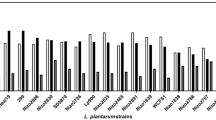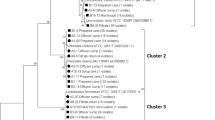Abstract
Four ruminal Prevotella type strains, P. ruminicola JCM8958T, P. bryantii B14T, P. albensis M384T, and P. brevis ATCC19188T, were characterized for polysaccharide-degrading activities with the reducing sugar release assay and zymogram analyses. Carboxymethylcellulase, xylanase, and polygalacturonate (PG)-degrading enzyme activities were determined in cultures grown on oat spelt xylan, xylose, arabinose, cellobiose, and glucose as sole growth substrates. P. ruminicola and P. albensis showed carboxymethylcellulase induction patterns. When xylan was supplied as a sole growth substrate, xylanase activities produced by P. bryantii and P. albensis were at least 18- and 11-fold higher, respectively, than during growth on other carbohydrates, suggesting that the regulation of the xylanases was highly specific to xylan. All strains constitutively produced PG-degrading enzymes. The corresponding activity of P. bryantii was more than 40-fold higher than in other strains. Zymogram analyses routinely detected the presence of high-molecular-weight (100–170 kDa) polysaccharide-degrading enzymes in ruminal Prevotella. Characteristics of the polysaccharide-degrading activities showed diversity of ruminal Prevotella species.
Similar content being viewed by others
Author information
Authors and Affiliations
Additional information
Received: 29 November 1999 / Accepted: 1 February 2000
Rights and permissions
About this article
Cite this article
Matsui, H., Ogata, K., Tajima, K. et al. Phenotypic Characterization of Polysaccharidases Produced by Four Prevotella Type Strains. Curr Microbiol 41, 45–49 (2000). https://doi.org/10.1007/s002840010089
Issue Date:
DOI: https://doi.org/10.1007/s002840010089




